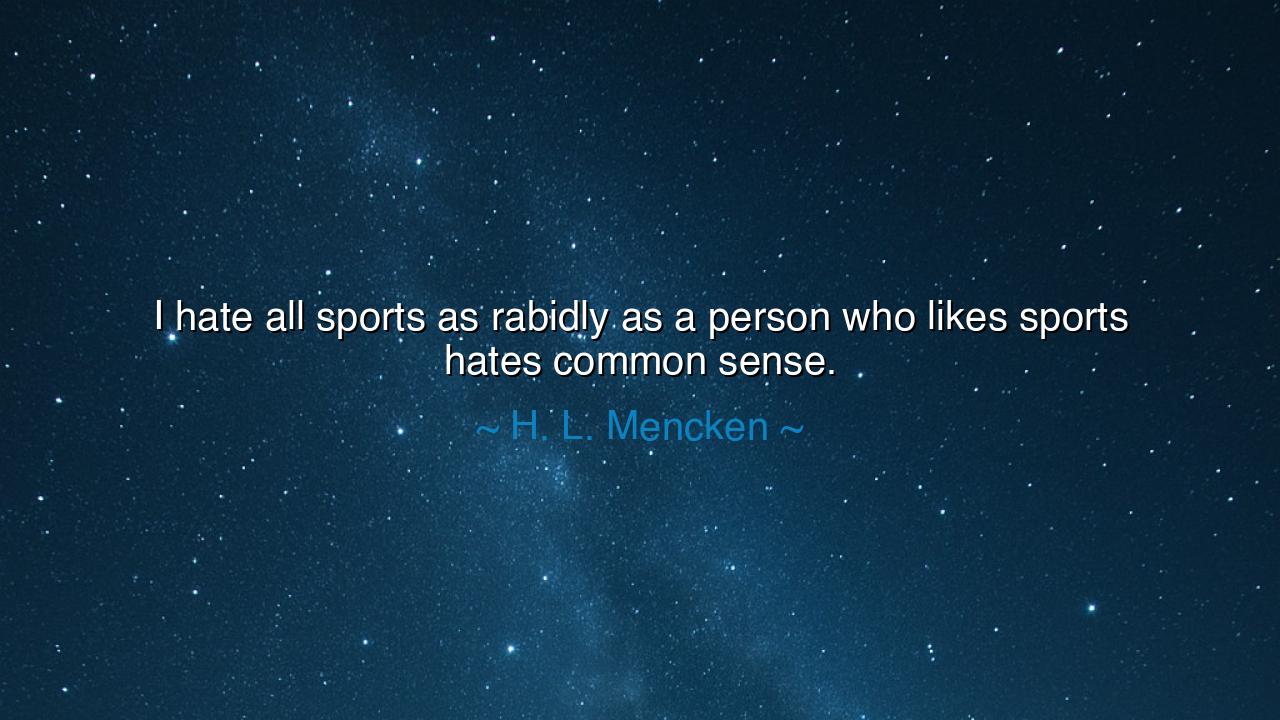
I hate all sports as rabidly as a person who likes sports hates






Hearken, O seekers of reflection, and attend the words of H. L. Mencken, who spoke with the sharp wit of a mind unafraid to challenge convention: “I hate all sports as rabidly as a person who likes sports hates common sense.” In these words lies a meditation upon the clash between passion and reason, the fervor of collective obsession and the quiet voice of judgment, and the way in which human devotion to spectacle can sometimes eclipse prudence and reflection.
The origin of this insight rests in Mencken’s life as a critic and observer of society. He witnessed the fervor that sport can ignite—a devotion that borders on worship, an emotional fire that inflames the masses and dominates conversation. To Mencken, the unthinking adoration of athletes and games seemed at odds with reason, contemplation, and discernment, provoking in him a reaction as intense as the fervor he observed. His words reflect a broader skepticism: that collective passion, when untethered from reason, can obscure judgment and distort priorities.
Consider the story of ancient Roman gladiators, whose contests captivated the populace and dominated public life. Citizens flocked to arenas, cheering victories, lamenting defeats, and forgetting in their excitement the lessons of moderation and reflection. To an observer such as Mencken, this devotion mirrors modern fanaticism: the human spirit enthralled by spectacle, sometimes to the neglect of common sense and higher pursuits. Both the roar of the stadium and the clamorous games of Rome reveal the seduction of untempered passion.
Yet there is also insight in Mencken’s hyperbolic comparison. His “rabid” hatred conveys not mere distaste, but a principled rejection of the elevation of sport above reason. Like the ancients who valued philosophy, civic duty, and moral reflection, Mencken asserts the primacy of discernment over emotional surrender. He reminds us that to partake fully in life, one must measure enthusiasm with judgment, passion with prudence, and celebration with reflection.
The ancients understood this tension well. Greek philosophers, such as Socrates and Aristotle, often warned against excess in all things, emphasizing moderation and the harmony of reason and desire. To revel in spectacle without measure was to court imbalance; to embrace common sense as a guiding principle was to cultivate virtue. Mencken’s words echo this enduring wisdom: enthusiasm, when unbridled, may cloud judgment, yet reason can illuminate the path even amid human exuberance.
From this reflection, a lesson emerges: recognize the forces that capture collective passion and temper them with discernment. Enjoyment of human endeavor—sport, art, or entertainment—need not be condemned, but it must be engaged with awareness, so that the mind remains guided by reason and the heart by reflection. Mencken’s insight is not merely a critique of sport, but a call to vigilance in all arenas where emotion vies with prudence.
Practical action flows naturally: cultivate self-awareness in your own pursuits, question the impulses of the crowd, and ensure that admiration and enthusiasm are accompanied by thought and balance. Engage with life fully, yet do not surrender judgment to spectacle. Observe, reflect, and participate consciously, allowing both joy and reason to coexist in harmony.
Thus, let the words of H. L. Mencken endure: the flame of passion can be fierce, but it must be tempered by the light of common sense. Beware the enthrallment of spectacle that blinds judgment, yet do not renounce engagement entirely. By balancing fervor with reason, emotion with insight, one may partake fully in life without losing the clarity and prudence that illuminate the path of wisdom.






AAdministratorAdministrator
Welcome, honored guests. Please leave a comment, we will respond soon